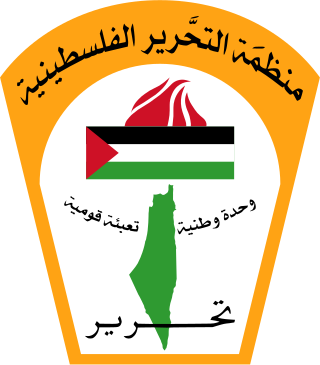
The Palestine Liberation Organization is a Palestinian nationalist coalition that is internationally recognized as the official representative of the Palestinian people in both the Palestinian territories and the diaspora. It is currently represented by the Palestinian Authority based in the West Bank city of Al-Bireh.

Yasser Arafat, also popularly known by his kunya Abu Ammar, was a Palestinian political leader. He was chairman of the Palestine Liberation Organization (PLO) from 1969 to 2004, President of the State of Palestine from 1989 to 2004 and President of the Palestinian Authority (PNA) from 1994 to 2004. Ideologically an Arab nationalist and a socialist, Arafat was a founding member of the Fatah political party, which he led from 1959 until 2004.

Ahmad al-Shukeiri was a Palestinian political leader and the first Chairman of the Palestinian Liberation Organization, serving from 1964 to 1967.

Mai Masri is a Palestinian filmmaker, director and producer. Her films are primarily documentaries which focus on the real life struggles of the women and children living in the occupied Palestinian territories and Lebanon. She has received over 60 international awards for her films and is hailed as a pioneer in the Middle Eastern film industry.
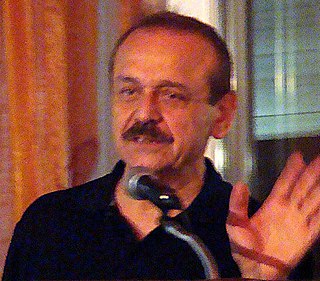
Yasser Abed Rabbo also known by his kunya, Abu Bashar is a Palestinian politician and a member of the Palestine Liberation Organization's (PLO) Executive Committee.

The Institute for Palestine Studies (IPS) is the oldest independent nonprofit public service research institute in the Arab world. It was established and incorporated in Beirut, Lebanon, in 1963 and has since served as a model for other such institutes in the region. It is the only institute in the world solely concerned with analyzing and documenting Palestinian affairs and the Arab–Israeli conflict. It also publishes scholarly journals and has published more than 600 books, monographs, and documentary collections in English, Arabic and French—as well as its renowned quarterly academic journals: Journal of Palestine Studies, Jerusalem Quarterly, and Majallat al-Dirasat al-Filistiniyyah. IPS's Library in Beirut is the largest in the Arab world specializing in Palestinian affairs, the Arab–Israeli conflict, and Judaica.

The Palestine Red Crescent Society is the humanitarian organization that is the International Red Cross and Red Crescent Movement in the State of Palestine, which includes the West Bank, including East Jerusalem, and the Gaza Strip.

Rosemarie Janet Said Zahlan was a Palestinian-American historian and writer on the Arab states of the Persian Gulf based in London. She was a sister of Edward Said. In addition to her books, she also wrote for the Financial Times, the Middle East Journal, the International Journal of Middle East Studies and the Encyclopedia of Islam.
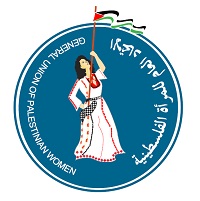
The General Union of Palestinian Women is the official representative of Palestinian women within the Palestine Liberation Organization (PLO). The GUPW's executive committee consists of several members including the president, co-founder Intissar al-Wazir. The GUPW was established in 1965 as a body in the PLO with the goal of creating an active role for women in the social, economic, and political spheres of the Palestinian territories. The GUPW advocates a democratic government and a sovereign Palestinian state as a precursor to attaining women's social and political rights. The GUPW has established branches in several countries in the Middle East and Europe to further support women's movements through educational opportunities, financial assistance, and more.
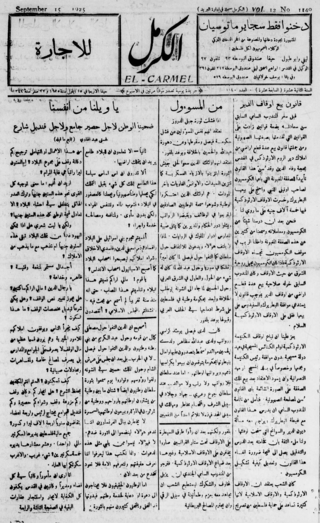
Al-Karmil or El-Carmel is a bi-weekly Arabic-language newspaper founded toward the end of Ottoman imperial rule in Palestine. Named for Mount Carmel in the Haifa district, the first issue was published in December 1908, with the stated purpose of "opposing Zionist colonization".

Tarab Abdul Hadi, also transliterated Tarab 'Abd al-Hadi, (1910–1976) was a Palestinian activist and feminist. In the late 1920s, she co-founded the Palestine Arab Women's Congress (PAWC), the first women's organization in British Mandate Palestine, and was an active organizer in its sister group, the Arab Women's Association (AWA).

The lives of Palestinian women have transformed throughout many historical changes including Ottoman control, the British Mandate, and Israeli control. The founding of the Palestine Liberation Organization in 1964 and the later establishment of the Palestinian Authority in 1994 also played a role in redefining the roles of women in Palestine and across the Palestinian diaspora. Arab women have been involved in resistance movements in Palestine, Jordan, Syria, and Lebanon throughout the 20th century and into the 21st century.
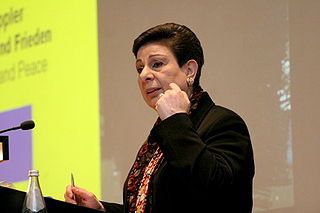
Hanan Daoud Mikhael Ashrawi is a Palestinian politician, activist, and scholar.
Fatima Mohammed Bernawi was a Palestinian who was involved with Fatah in the mid-1960s, a significant period of the Israeli–Palestinian conflict. She was known as the first Palestinian woman to have organized a terror attack in Israel—the attempted bombing of a movie theatre in October 1967.
May Musa Sayegh, also spelled Mai Sayegh, was a Palestinian poet, feminist, political activist, and writer.
Randa George Yacoub Siniora is a Palestinian human rights and women's rights activist. She has documented human rights violations in the occupied Palestinian territories for three decades, and is currently general director of the Women’s Center for Legal Aid and Counseling (WCLAC) in Jerusalem.
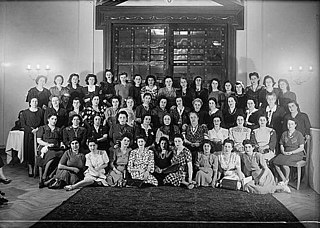
The Arab Women's Association of Palestine (AWA) also known as the Arab Women's Association was a Palestinian women's organization founded by the Arab Women's executive committee (AWE) in Jerusalem in the mandate of Palestine on 26 October 1929.
Wahida al-Khalidi was a Palestinian women's rights activist.

Zulaija Al-Shahabi (1901-1992), was a Palestinian women's rights activist.
Sadhij Nassar was a Palestinian activist and journalist. She is known for her work on the newspaper Al-Karmil with her husband, Najib Nassar, and for being the first Palestinian woman taken as a political prisoner under the British Mandate. In 2022, Middle East Eye described her as one of 'the most prominent Palestinian feminists'.














